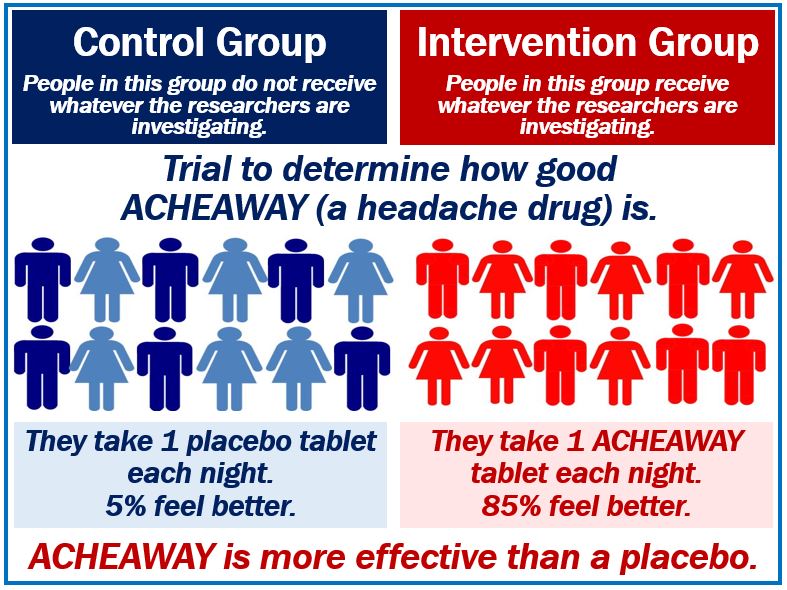The Control Group is the group in an experiment that is free of intervention by the researchers. The control group in a clinical trial, for example, comprises people who do not receive the medication that the researchers are studying.
This group contrasts with the ‘intervention group‘ or ‘treatment group.’
In an experiment, the control group either receives no treatment or gets the standard treatment.
Ensuring the ethical treatment of participants in the control group is paramount, as they must receive the best-known method of care if an existing, effective treatment is available.
Cambridge Dictionary defines control group as “a group of people who are used for comparing another group to in a test or experiment.”
Control group – example
Let’s imagine that a fictitious company – ACME Therapy – has a new experimental drug. The company has given its new drug the name ‘AcheAway.’ AcheAway is for the treatment of splitting headaches.
Its researchers want to know how effective it is. So, they decide to carry out an experiment or trial that compares it with a placebo.
A placebo is a dummy drug. In other words, a pretend medicine that has no active ingredient. Perhaps it is made of flour with chalk. However, the human volunteers in the trail don’t know this.

Three groups
The researchers recruit 80 volunteers. They all suffer from regular splitting headaches. In this trial, each time they have a headache, they receive a tablet. They do not know what the tablet has.
The doctors who give them the tablets do not know whether they are giving the volunteers a placebo, or AcheAway.
When neither the doctors nor the volunteers know what is in the tablets, it is a ‘double-blind trial.’
The trial organizers split up the 80 volunteers into two groups of forty:
-
The intervention group
The people in this group receive a tablet containing AcheAway every time they have a headache.
-
The control group
The volunteers in this group get a placebo tablet whenever they have a headache.
-
The trial results
The trial lasts twelve weeks. At the end of the period, we have the following statistics:
- Of the 40 people in the intervention group, 34 (85%) said their tablet helped them. In other words, it reduced their headache symptoms.
- Of the forty volunteers in the control group, just nine (22.5%) said their tablet reduced their headache symptoms.
By comparing the results of the intervention group with the control group, we now know that AcheAway is better than a placebo. In medicine or experiments, we say that there was a ‘statistically significant’ difference (There is a significant difference between 85% and 22.5%).
This evidence paves the way for subsequent studies to explore the long-term effects and potential side effects of AcheAway in a larger population.
Pharmaceutical industry
If a pharmaceutical company wants FDA approval for a new drug in the United States, it needs to carry out several trials, including clinical trials (with humans).
It then submits all the details of those trials to the FDA. FDA stands for Food and Drug Administration. The FDA is the US regulatory agency in charge of medications, tobacco products, foods, cosmetics, and medical devices.
Compound phrases containing “control group”
There are many compound phrases that contain the words “control group.” A compound phrases is a term that consists of two or more words. Let’s have a look at some of them:
-
Control Group Variables
The factors in an experiment that are held constant to test the relative impact of an independent variable.
“To ensure accurate results, the researchers meticulously monitored the Control Group Variables throughout the study.”
-
Control Group Dynamics
The interactions and behaviors within a control group that could influence the outcome of an experiment.
For example: “The study’s outcome required a careful analysis of Control Group Dynamics to account for any anomalies.”
-
Control Group Bias
Any influence that the control group might have on the results of an experiment, often unintentional, that can skew results.
For example: “The team implemented blind testing to minimize Control Group Bias and maintain objectivity in the trial results.”
-
Control Group Selection
The process of choosing individuals or subjects to make up the control group in an experiment.
For example: “Control Group Selection was randomized to ensure that the sample accurately represented the population.”
-
Control Group Data
The information and results collected from the control group during an experiment.
For example: “After collecting the Control Group Data, it was evident that there was no significant effect from the placebo.”
Video – What is a Control Group?
This interesting video presentation, from our YouTube partner channel – Marketing Business Network, explains what a ‘Control Group’ is using simple and easy-to-understand language and examples.
